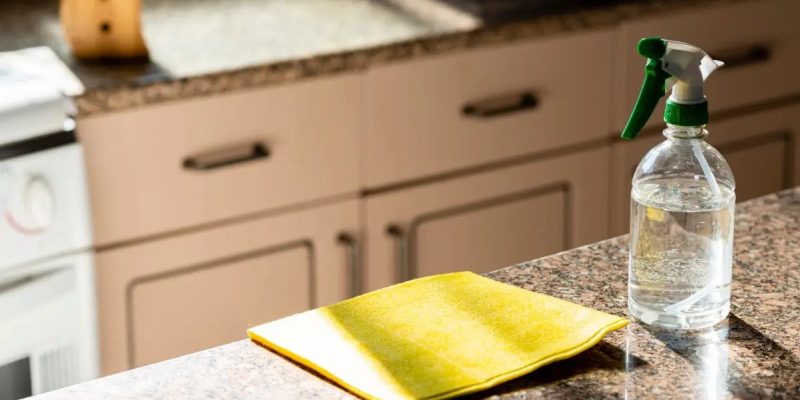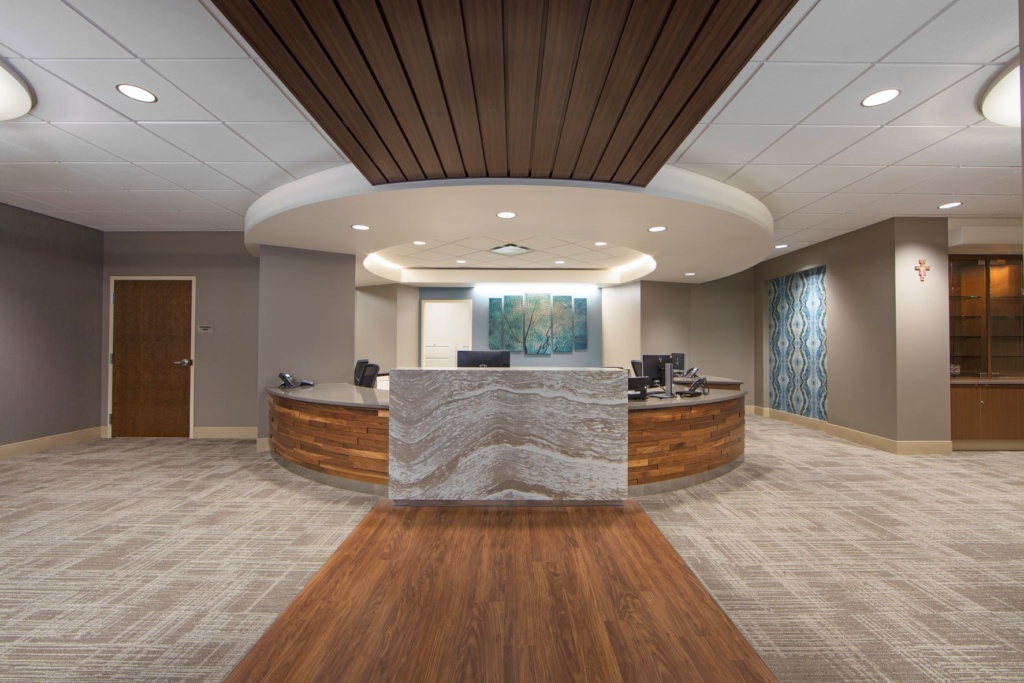


Healthcare environments demand a higher standard than any other commercial space. Hospitals, clinics, laboratories, and medical offices must balance infection control, durability, aesthetics, and long-term value in every material choice. Among all surfaces, countertops play a critical role in daily operations, patient safety, and hygiene. From nurse stations and reception desks to exam rooms, laboratories, and bathroom vanities, selecting the right healthcare counter stone directly impacts cleanliness, workflow efficiency, and overall patient experience.
In healthcare facilities, the risk of Healthcare-Associated Infections (HCAIs) is a constant concern. Countertops, like door handles and medical equipment surfaces, can become transmission points for bacteria and pathogens if the wrong materials are used. This is why non-porous, easy-to-clean, and antimicrobial-friendly countertop materials are essential for modern healthcare design.
At Teccorp Stone, we specialize in designing and fabricating high-performance stone surfaces for medical environments across Ontario. Our experience with healthcare countertops allows us to guide facilities toward materials that meet strict hygiene standards while delivering durability and professional aesthetics.

Every surface in a hospital or healthcare center has the potential to harbor microorganisms. Unlike residential spaces, medical environments require constant sanitation and resistance to harsh disinfectants. Countertops must withstand heavy daily use, chemical cleaners, moisture, and temperature fluctuations without degrading or becoming porous.
Key factors when selecting the best healthcare countertop stone include:
Healthcare outcomes are influenced not only by medical treatment, but also by the cleanliness and visual comfort of the environment. Well-designed surfaces contribute to patient trust, staff efficiency, and regulatory compliance.
Quartz countertops are widely considered the gold standard for healthcare applications. As an engineered stone, quartz is non-porous, meaning it does not absorb liquids, bacteria, or chemicals. This property alone makes quartz one of the safest choices for hospitals, clinics, and laboratories.
Quartz does not require sealing, eliminating ongoing maintenance concerns.
From an aesthetic perspective, quartz offers clean, modern designs that help create calm and welcoming healthcare spaces. For facilities seeking reliability, hygiene, and longevity, quartz remains the most popular and practical solution.
Porcelain countertops have rapidly gained popularity in healthcare design due to their exceptional density and durability. Porcelain slabs are fired at extremely high temperatures, resulting in a surface that is nearly impervious to water, chemicals, and bacteria.
Compared to ceramic tile, porcelain is stronger and more resistant to wear, making it ideal for commercial and hospital environments. Its low water absorption rate makes it frost-resistant and suitable for both indoor and outdoor medical applications.
Research has shown that porcelain surfaces naturally reduce the presence of bacteria such as E. coli and Staphylococcus aureus. This antimicrobial advantage, combined with minimal maintenance requirements, makes porcelain an excellent alternative to quartz for healthcare countertops.
Natural stone materials such as granite, marble, and quartzite can also be used in healthcare environments when properly specified and maintained.
While natural stone is more porous than engineered materials, high-quality sealing and professional fabrication significantly reduce the risk of contamination. Granite, in particular, offers excellent durability and resistance to heat and impact, making it suitable for reception areas and administrative spaces.
Marble is less commonly used in clinical zones due to its maintenance needs, but it can be appropriate for low-contact areas where aesthetics are prioritized. Quartzite offers superior hardness and durability, combining the beauty of natural stone with higher performance.
Antimicrobial performance is a top priority in healthcare environments. Countertops must actively resist bacterial growth and support strict infection control protocols.
These materials outperform traditional options such as laminate or plastic-based surfaces, which may contain formaldehyde or degrade under frequent cleaning.
Not all countertop materials are suitable for medical environments. Surfaces that are porous, difficult to sanitize, or chemically unstable should be avoided.
If laminate must be used for budget reasons, it should be specified with no-added-formaldehyde (NAF) substrates and limited to non-clinical areas.
Value in healthcare countertop selection is not defined by price alone. True value is the balance between hygiene, durability, and aesthetics over time. Materials such as quartz and porcelain reduce maintenance costs, lower infection risks, and extend the lifespan of surfaces.
Facilities across Ontario trust Teccorp Stone’s healthcare countertop solutions to deliver precision fabrication, professional installation, and materials that meet the highest medical standards.
Whether designing a new hospital wing, upgrading a clinic, or renovating a medical office, selecting the best healthcare counter stone is a decision that impacts safety, efficiency, and patient confidence for years to come.